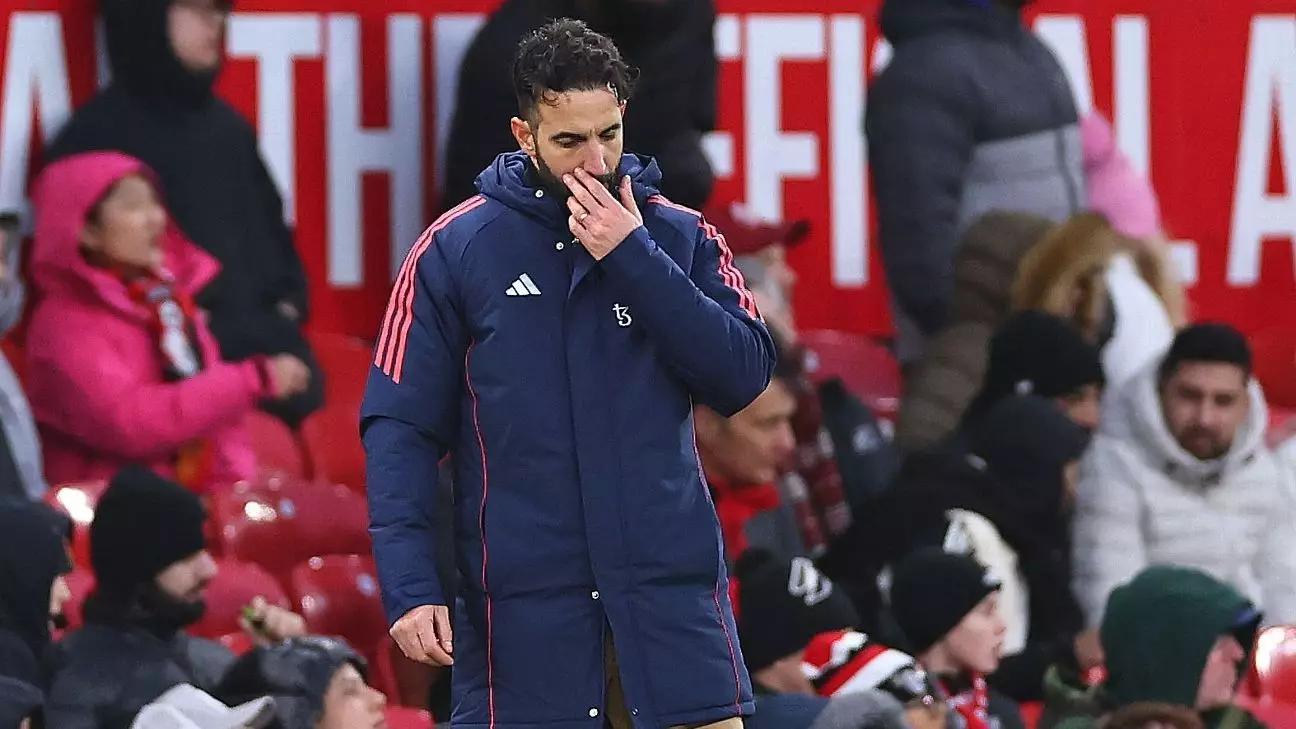The situation at Manchester United has reached a critical juncture following their disheartening 3-0 defeat to Bournemouth at Old Trafford. This latest loss marked the second consecutive setback for the Red Devils, who previously succumbed to Tottenham Hotspur in a thrilling yet disappointing 4-3 encounter in the Carabao Cup. The back-to-back defeats underscore deepening concerns surrounding the team’s performance and morale, especially at home, where supporters expect much more. Head coach Ruben Amorim has characterized this period as particularly challenging, leaving many to ponder the long-term implications for what is arguably one of the most storied clubs in football history.
For Manchester United, the expectations are monumental; the club prides itself on its illustrious past, filled with legendary victories and a robust fanbase. Amorim’s admission of the current “tough moment” is telling and reflects the disappointment permeating through the ranks, from the players to the fans. A home loss of this magnitude has significant ramifications, as supporters voice their discontent over the team’s ability to perform at Old Trafford. The pressure on Amorim to turn the tide is palpable, and the ongoing struggles may weigh heavily on both his tactics and the players’ mental fortitude.
Set-Piece Struggles and Mental Blocks
A recurrent theme echoed by Amorim is the team’s inefficiencies during set-pieces, a facet of the game that has plagued them significantly in recent matches. The opening goal against Bournemouth, a header from Dean Huijsen following a well-placed free kick from Ryan Christie, exemplifies these ongoing defensive vulnerabilities. Despite Amorim’s recognition of this issue, he is adamant that the defeat should not be solely attributed to set-piece failures. Instead, he contextualizes the defeats within a broader narrative of missed opportunities and the psychological burden felt by both players and fans alike.
Indeed, Amorim highlighted the importance of improving on set pieces while simultaneously acknowledging that the team’s failure to convert their own scoring opportunities has created an atmosphere fraught with anxiety. The cyclical nature of confidence and fear during matches can be catastrophic, especially for a team struggling to assert itself. The psychological aspect of high-stakes games cannot be understated; the anxiety permeating through the team seems to increase with every missed chance, leading to further mistakes and compounded issues on the pitch.
One of the most pressing issues that Amorim has faced is the team’s game management, especially in pivotal moments that have low-key defined their recent performances. In previous encounters, particularly the match against Tottenham, the team demonstrated a worrisome trend of conceding quick goals, a pattern that was replicated in the encounter against Bournemouth. The fact that Bournemouth scored two goals within a short span during the second half serves as a glaring indicator of Manchester United’s defensive fragility and lack of composure when under pressure.
Amorim’s acknowledgment of this as a mental challenge is vital in understanding what the club must address moving forward. The players’ increasing anxiety, felt acutely during critical moments, reflects not only on their skills but also on their resilience. The task ahead for Amorim is formidable, as rebuilding mental strength and composure is as crucial as refining technical skills on the field.
Despite the gloom surrounding the club, there exists a path to redemption. Amorim has expressed a desire to confront these issues head-on, emphasizing the need for improvement and readiness to tackle the multifaceted problems plaguing the squad. Acknowledging the current state of affairs is the first step towards recovery, and United’s next games will be pivotal in turning this ship around. The coaching staff’s proactive approach to address both tactical and psychological dimensions will be crucial in rediscovering their winning form.
While the situation at Manchester United appears dire, it is not without hope. Engaging in self-reflection and strategic realignment will be key to navigating these turbulent waters. For the players, coaching staff, and the passionate fanbase, the toil of this transitional phase must be accepted as part of the journey towards reclaiming their status as a football powerhouse.

